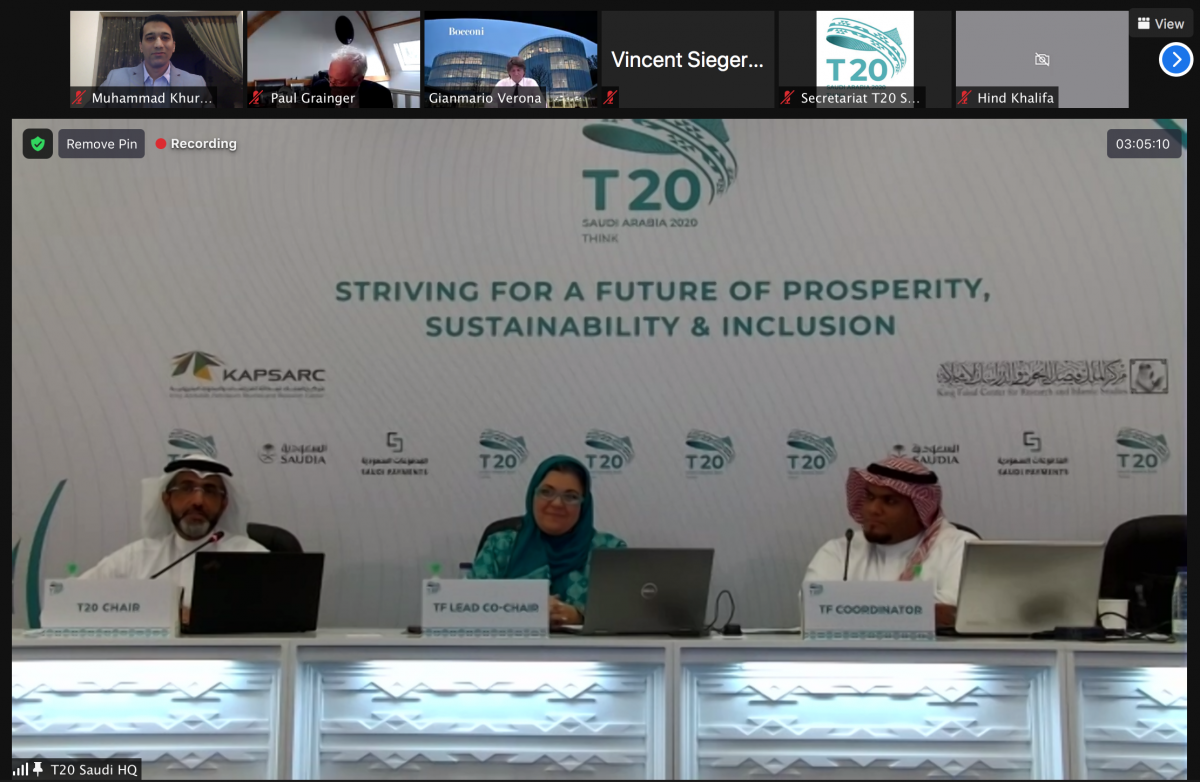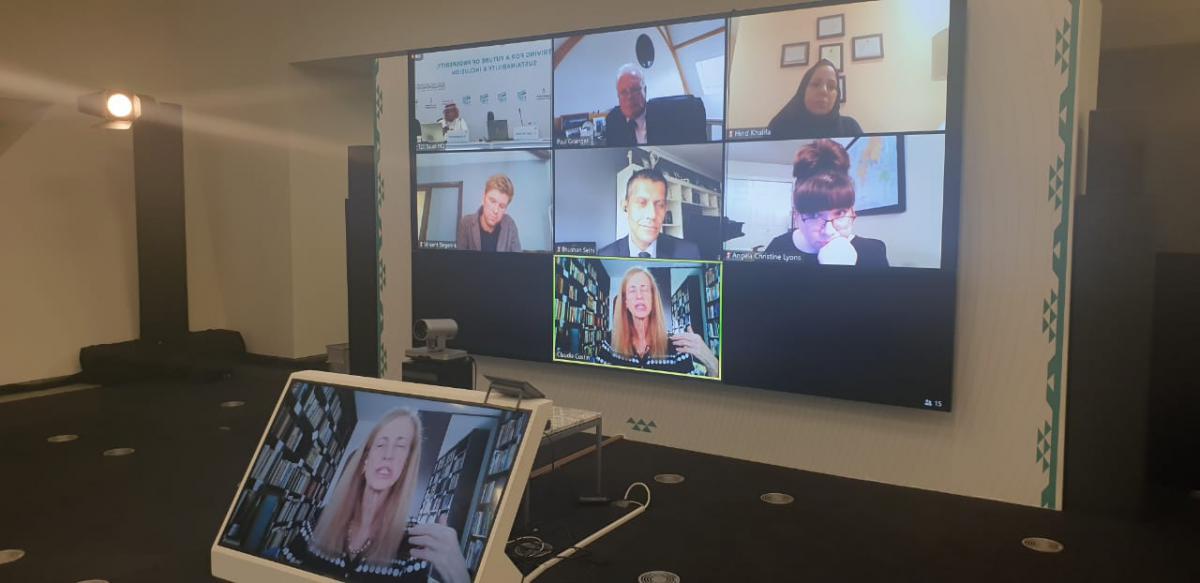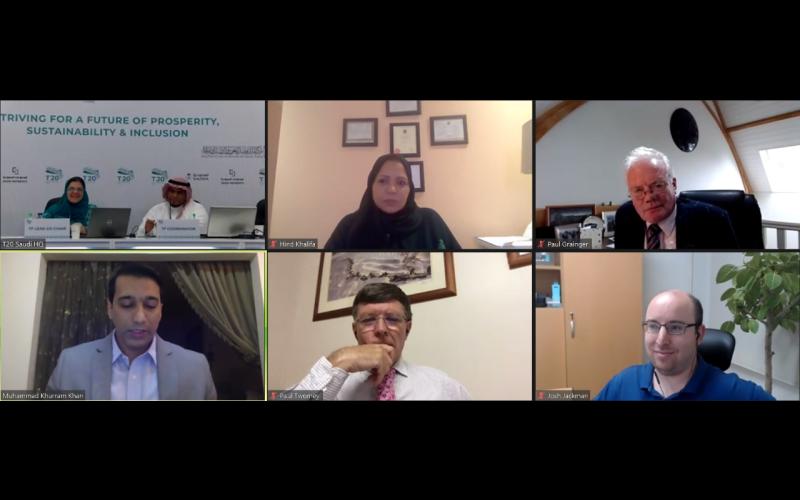KSU Represented at the T20 Summit Season under the G20 Presidency
KSU Represented at the T20 Summit Season under the G20 Presidency
The G20’s Think20 (T20) engagement group has kickstarted the summit season with a series of overwhelming webinars to discuss its progress along with the policy-based solutions that address the most prevailing challenges amid COVID-19. Among one of the T20 events, the task force 6, which oversees the ‘Economy, Employment, and Education in the Digital Age’, organized a webinar on 6 October 2020 to discuss some of the pressing issues faced by the global community. T20 is one of the engagement groups of the G20, which is considered as the idea bank and consists of think tanks, leading scholars and subject matter experts from the world. Throughout the year, T20 continues discussions under its task forces (TF) and comes up with the research-based policy recommendations presented to the G20 leaders through a communique.

This overwhelming event was co-hosted by the King Abdullah Petroleum Studies and Research Centre (KAPSARC) and the King Faisal Center for Research and Islamic Studies (KFCRIS). The webinar started off with welcome remarks given by the task force lead co-chair Dr. Heidi Alaskary, who is also the CEO of Special Olympics, Saudi Arabia. Dr. Heidi highlighted the progress of the task force work and appreciated the authors of 12 policy briefs who proposed a set of extraordinary fact-based recommendations to the T20 in the areas of digital education, capacity development, diversity and inclusion, future of work, digital livelihoods, cybersecurity of children, and skills development, etc. She also acknowledged the efforts of all task force co-chairs as well as the coordinator Mr. Kameal Al-Ahmed from KFCRIS.
The webinar was followed by a keynote speech presented by Dr. Carlos Leal, the president of Getulio Vargas Foundation, Brazil. Dr. Carlos highlighted that novel strategies in education is adamantly important as it is the only pathway to the bright future. In his speech, he discussed the key challenges in the current education system amid COVID-19, which has affected over a billion children around the world. He underscored the importance of innovation and entrepreneurship in the universities and educational institutions, which should be promoted to spur innovation and growth. Furthermore, he also emphasized to adopt the new norms in online education and work, which are important until life is returned back to normal.

The webinar then hosted a panel discussion on “Beyond Password Protection - Honoring Personal Identities and Maintaining Autonomy in Cybersecurity”. The panel was moderated by Prof. Muhammad Khurram Khan, a distinguish professor of cybersecurity at the Center of Excellence in Information Assurance at King Saud University, Saudi Arabia. Prof. Khan is also the founder & CEO of the Global Foundation for Cyber Studies & Research in Washington D.C., USA. At the outset of the session, Prof. Khan welcomed the panelists and highlighted the importance of cybersecurity in the recent unprecedented times. He emphasized that cybersecurity has just gone beyond a buzzword and is getting considerable attention and prominence in all aspects of human activities. He further explained that theft of data & Intellectual property, spread of misinformation via online platforms and social media, & persistent and tenacious cyberattacks are threatening the fabric of our hyper-connected, yet too much interdependent society. Prof. Khan continued to express that the internet permeates into things that make up the internet of things, and then cybersecurity risks and threats are multiplied from machines to individuals, individuals to critical infrastructure, and critical infrastructure to the global security. Consequently, the world becomes vulnerable to a cyber pandemic, which could threaten our socio-economic system and prosperity.
The panel consisted of three local and international experts, including Dr. Hind Khaled Mohammed Khalifa, a Professor of Sociology at King Saud University; Dr. Joshua Jackman from Sungkyunkwan university South Korea, and Dr. Paul Twomey from Centre for International Governance Innovation (CIGI). The panelists highlighted and discussed the child online safety, governance of children digital spaces, online risks faced by children and vulnerable populations, the need for autonomy while online, and the strategies and solutions to address data trafficking and privacy.

After the panel session, Ms. Marwah Almugait gave a presentation of Saudi artwork that incorporates and reflects task force themes. Her work is a manifestation and master piece of art that depicts the significance of Bab al-Bunt through visual narratives.
The webinar also hosted a second panel discussion on “The Digital Future and Wellness”, which was moderated by Prof. Paul Grainger from University College London, UK. The participants of this panel included, Dr. Cláudia Costin, the founder and director of CEIPE Fundação Getulio Vargas (FGV), Brazil; Dr. Angela Lyons from University of Illinois at Urbana-Champaign USA; Mr. Bhushan Sethi from PwC USA, and Mr. Vincent Siegerink from the Organization for Economic Co-operation and Development (OECD). The panel discussed and highlighted the importance of upskilling, digital future, challenges of work, and impact of education and technology on work.
Followed by the panel discussion, Mr. Victor Pinedia, the president of World enabled, delivered a speech on “CTRL - ALT - ACTIVATE: Reimagining and Inspiring New Pathways for All”. In this speech, Mr. Victor highlighted the new technological arenas, which are shaping the smart cities and bringing in novel experiences and opening up new frontiers to enable communities for productivity, efficiency, and a high standard of life.

Photo courtesy T20 Secretariat
Afterwards, Prof. Gianmario Verona, the Rector of Bocconi University, Italy shared Italian perspective with the audience. Prof. Verona highlighted the importance of innovation that underpins the technological advancements for the prosperity of human beings. He also discussed the benefits of the fourth industrial revolution that is going to make a tremendous impact on all sectors and businesses of the World.
To close the overwhelming webinar, Dr. Fahad M. Alturki, the chair of T20 Saudi Arabia and Vice President of King Abdullah Petroleum Studies and Research Center shared his insights and remarks. He thanked the task force co-chairs, authors, speakers and participants for their wonderful contributions in drafting the impactful policy works for the G20. He also iterated the importance of multilateralism and collaboration in addressing the challenges faced by the global community.
It is to note that the task force 6 of the T20 recommends policies to the G20 to reform education, and provide opportunities for training, jobs and entrepreneurship in the changing global labor market. It also addresses the digital gender gap, and proposes novel initiatives available to develop practical and self-sustaining solutions through digital transformation, AI and other emerging technologies. Moreover, the task force explores the work to reduce cybersecurity risks and enhance data privacy for the global community.

